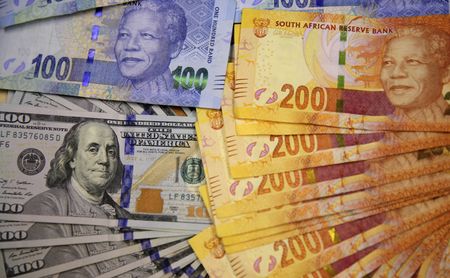JOHANNESBURG (Reuters) -The South African rand weakened in afternoon trade on Tuesday, giving up gains made earlier in the session, as a fall in commodity prices weighed.
At 1451 GMT, the rand traded at 15.2500 against the dollar, about 0.8% weaker than its previous close.
A rise in commodity prices especially for precious metals, which benefit resource-rich South Africa, had supported the rand earlier in the session to break below the 15.0000 a dollar mark.
But later gold, a key South African export, retreated from a multi-month peak as news about some Russian troops near Ukraine returning to their bases drove a rebound in riskier assets. Platinum also dipped.
“The rand has been at the mercy of U.S. data (dollar) and geopolitical risk … as sentiment fluctuates almost daily between ‘risk on’ and ‘risk off’ modes,” DailyFX analyst Warren Venketas said in a note.
“Today was no different after Russian troops were announced to be retreating from the Ukrainian border.”
In stocks, strong results from Glencore, an upbeat trading statement from grocery chain Spar Group and positive news from Steinhoff helped offset declines in commodity-linked shares, lifting both bourses a tad higher.
The Johannesburg All-Share index closed 0.12% firmer at 75,853 points, while the Top-40 index inched 0.06% higher to 69,169 points.
Johannesburg-listed shares of Glencore firmed 1.69% after the mining giant said it will set aside $1.5 billion for probes into bribery and market manipulation, which it expects to resolve in 2022, as it announced record earnings from booming raw materials prices.
The company also announced a $4 billion dividend payout.
“The Glencore deleveraging story is over. It is now a capital returns story, and we expect rising prices for some of its key commodities and continued outperformance of its marketing segment to lead to growing free cash flow and capital returns,” Jefferies equity analysts said in a note.
Supermarket chain SPAR Group rose 3.70% after it said sales for its 18-week period ended Jan. 29 were up 5.8%.
Retailer Steinhoff jumped 4.30% after it said it had started paying shareholders who lost billions of rands when the group’s stock plunged in late 2017 due to accounting fraud, finally removing the single most significant overhangs for the owner of clothing chains across Europe and Africa.
The government’s benchmark 2030 bond firmed, with the yield dipping 4.5 basis points to 9.185%.
(Reporting by Alexander Winning, Olivia Kumwenda-Mtambo and Nqobile Dludla; Editing by Maju Samuel)










